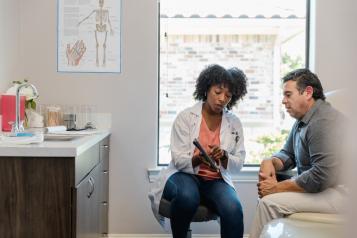Who are physician associates and what do they do?

Have you heard of physician associates? Since 2003, they've been caring for NHS patients. Physician associates can check your health, request tests to help find out what's wrong, and work with doctors to plan your treatment.
With the NHS planning to employ more physician associates, find out what care they can offer you and how their role differs from that of doctors.
What are physician associates?
What do physician associates do? Physician associates are healthcare professionals who work under the supervision of a senior doctor, such as a hospital consultant or a GP.
They are trained to perform various clinical duties, such as taking medical histories, conducting physical examinations and developing and managing treatment plans.
Since 2003, the number of physician associates working in the NHS has grown to 3,000, and there are plans to employ 10,000 by 2036.
What kind of education and training do physician associates receive?
Physician associates complete a three-year undergraduate degree, usually in a health, biomedical science, or life-sciences subject, followed by a two-year postgraduate qualification.
The postgraduate training for physician associates covers some of the same topics as a medical degree but is less in-depth.
Like medical training, physician associate training involves supervised practice with patients.
When would I see a physician associate?
If your care needs are not complex or you need to see someone quickly, your GP practice might offer an appointment with a physician associate.
Before your appointment, your practice should tell you which healthcare professional you will see.
You may also see a physician associate in a hospital.
Physician associates work in various specialities such as emergency medicine, acute medicine, geriatrics, psychiatry, general surgery, respiratory medicine, trauma and orthopaedics, cardiology, and general internal medicine.
They review patients’ medical histories, perform examinations, and request diagnostic tests.
How are physician associates different from doctors?
Despite having 'physician' in their title, physician associates are not doctors. Physician associates:
- Have around two years of training compared to the ten years of an average fully qualified GP.
- Must be supervised by a senior doctor.
- Are not currently allowed to prescribe medication or request ionising radiation, such as a chest X-ray or a CT scan.
How do I know if I'm seeing a physician associate?
If you are unsure who is providing your care, you should ask them.
All healthcare professionals are advised to introduce themselves to patients and explain who is responsible for their care and the roles of other team members.
Guidance for physician associates says when you first meet them, they should:
- Offer you the opportunity to ask about their role;
- Explain that they are not a doctor and give enough time to explain their job, including their training and qualifications; and
- Tell you that they work under the supervision of a named senior doctor.
Can I choose which professional I see?
You can choose which GP practice you register with and ask to see a particular doctor, nurse, or healthcare professional at the practice.
Your practice should make every effort to meet your preference, although there may be occasions when this is not possible. For example, a particular doctor, nurse, or other healthcare professional may be on leave or at full capacity with no available appointments.
Why are more physician associates being recruited?
The NHS plans to recruit and train more doctors, nurses, allied health professionals, and other professionals, which includes physician associates.
Healthcare in the twenty-first century is often delivered by multi-professional teams with different specialist skills and capabilities.
Having a physician associate on an NHS team can result in quicker access to care for some patients and help reduce the workload of other clinical professionals.
This may help free up time and resources for doctors, for example, to better support other patients.
Who checks they're practising safely and appropriately?
Currently, physician associates are not statutorily regulated. A senior doctor must supervise them to ensure they are working safely.
Physician associates must work under a dedicated medical supervisor which will be consultant, GP, or other senior medical personnel.
The Faculty of Physician Associates maintains a voluntary register of all those who meet the required standards to practice. You can search this register online.
From December 2024, the General Medical Council will regulate physician associates, the organisation that ensures doctors are safe to practice.
What should I do if I am unhappy with my care or concerned about patient safety?
Talk to the staff at the place where you received healthcare treatment. Ask them how to raise a concern or make a complaint. You should be able to raise a concern by speaking to someone at the service, in writing, or by email.


